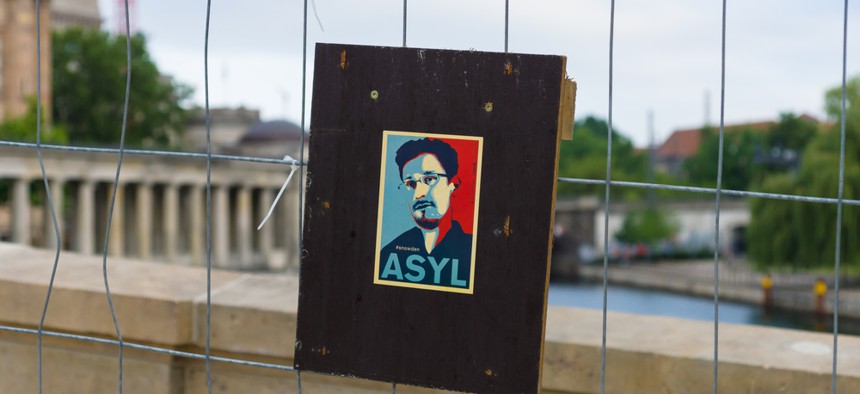
A sign supporting Edward Snowden sits on a bridge in Berlin. Bocman1973/Shutterstock.com
Snowden: France’s 'Intrusive' Surveillance Laws Failed to Stop Paris Attacks
The problem with mass surveillance is that you're burying people under too much data,” the fugitive leaker said.
Edward Snowden is pointing to the recent terrorist attacks in France as evidence that government mass-surveillance programs don't work because they are "burying people under too much data."
"When we look at the Paris attacks specifically, we see that France passed one of the most intrusive, expansive surveillance laws in all of Europe last year, and it didn't stop the attack," the fugitive leaker said in an interview with NOS, a Dutch news organization, released Wednesday. "And this is consistent with what we've seen in every country."
Snowden was referring to a provision the French Legislature approved in December 2013 that broadened the conditions for when its intelligence agencies could listen in and record telephone conversations or various digital information, such as emails and location data. The provision does not require judicial approval for spying on electronic communications for a wide array of purposes that include national security and terrorism.
His argument is a familiar one from the former National Security Agency contractor, who fled to Russia 18 months ago after leaking a trove of top-secret information to journalists about the U.S. government's sweeping surveillance powers. The 31-year-old computer analyst has often suggested that government agents could more ably thwart terrorism if they weren't so distracted by mountains of dragnet surveillance data.
Seventeen people have died in France this month due to the terrorist attacks on Charlie Hebdo, a satirical newspaper, and a kosher deli, prompting some of the country's government officials to publicly call for even more aggressive surveillance—--possibly something akin to the post-9/11 USA Patriot Act. Leaders of other nations in Europe, including British Prime Minister David Cameron, have echoed the call for more robust counterterrorism and national security laws.
Running parallel to Europe's debate is a looming expiration of key provisions of the Patriot Act on June 1, including a section that grants the intelligence community much of its surveillance authority. Lawmakers intent on reining in the NSA see the deadline as potential leverage for their cause, though the Republican majority in the Senate has indicated it is unwilling to make many concessions and may favor a clean reauthorization.
Government spies have defended bulk intelligence gathering as necessary, because finding a needle often requires assembling the entire haystack. But critics of government surveillance, including Snowden, insist that no evidence exists to support the claim that such programs do anything to protect national security—and may even distract analysts from other, more useful intelligence.
"When you look at the United States, the Patriot Act, the mass surveillance that's been debated and criticized since 2013, the White House did two independent investigations into its effectiveness and found that despite monitoring the phone calls for everyone in the United States every time they pick up the phone, it hadn't stopped a single attack," Snowden said in his NOS interview.
"We see the same thing in London. It didn't stop the attacks in Spain. It didn't stop the attacks in Boston," he continued. "The problem with mass surveillance is that you're burying people under too much data."
Snowden has repeatedly referenced the 2103 Boston Marathon bombing to suggest mass surveillance may in fact undermine the mission of intelligence agencies. Dzhokar and Tamerlan Tsarnaev were pointed out by Russian intelligence to U.S. officials before the bombings in 2013, which killed three and left hundreds more wounded.
In the new interview, Snowden recounted a conversation he had with a colleague at the NSA the day of the Boston attacks.
"I said to him, 'You know, I'm willing to bet almost anything that we knew who these people were, that we had something on them,' and later on we found out that was the case," he said.
(Image via Bocman1973 / Shutterstock.com)







